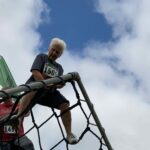By Mary Koeberl Rechenberg
This story was first published in the January 2021 issue of “The Best Years (TBY).”
Reading the Little House books by Laura Ingalls Wilder at the age of nine gave me reason to believe my life was pretty special. After all, she wrote about many things I could relate to from my own family. It didn’t take long, and I developed an appreciation for things from the olden days.
Needless to say, when I grew up, every time I came across many of the items we used when I was a kid, I had to have them. My basement is now my favorite place, full of items that tell my life’s story.
My three sisters and I grew up on a farm in Southeast Missouri where we raised chickens, cattle, hogs and crops. Most of the items I have collected are typical of a farm home in the early days of my youth. The metal cream can, old milk bottles and egg basket tell the story of the farm animals I helped tend. Since the major income on a farm only comes a few times a year, the cream and eggs we sold weekly provided grocery money.
My Keen Kooker wood stove is exactly like the one our family used until 1955. I remember carrying many armloads of split wood to keep the fire burning. We didn’t need a microwave oven to warm Daddy’s supper when he came in late. Mama just put a plate of food in the warming section above the stove top. Sometimes when I walk past, I detect the faint smell of sugar-cured ham, peach cobbler and freshly-baked bread.
Mama scrubbed everything from diapers to Daddy’s overalls on a washboard like mine until Daddy could afford to buy her a wringer washing machine. A visiting child once asked me, “What are those wooden things in that basket?” I could easily educate him on how clothespins work on a line strung up outside for drying clothes. I miss the fresh smell of air-dried laundry. A hand-made coat rack, which once hung in my husband’s childhood home, displays a flour sack baby gown, my husband’s little coat made from his daddy’s old suit pants and my former sister-in-law’s christening outfit from 75 years ago. These items speak of faith in God and resourcefulness in hard times.
Animal feed, sugar and flour were sold in cloth bags in the days of my childhood. Flour and sugar came in white and off-white bags. Chicken, hog and cattle feed came in colors and print designs. Mama, along with other farm wives, sewed clothes, curtains, quilts and other necessities for their families with this material, which we considered free.
Learning to sew was a necessity long ago, unless you were wealthy. Mama’s old treadle machine took a great deal of concentration and skill to guide the fabric to the needle, while at the same time maintaining a smooth and steady speed with your feet on the treadle. Mama taught herself to sew and made clothes for her four daughters and herself on a White treadle machine. When I was nine years old, I started making doll clothes on that same machine. I now have the cabinet of a similar machine. The treadle part is missing, but it is a constant reminder of my mama’s determination and love.
My book shelf holds a collection of old books, family photos, the 1950’s pencil box my husband used in grade school (the kind with math facts on the sliding ruler) and a valentine my grandmother received from her teacher in 1910, among other things that remind me of the one-room school my sisters and I attended, our special teachers and deep family ties.
My five-gallon crock holds memories of hard work: sauerkraut making time, pork sausage and hog butchering. The long-handled popcorn popper made popping corn an adventure. I have numerous cooking and canning utensils, which are obsolete in today’s modern kitchens but were essential before electric appliances came along. It is interesting to note they are all stamped “Made in the USA.”
Quilts hold a special place in my home and my heart, reminding me of the drafty old farmhouse I grew up in and the challenge to keep warm. My flower garden quilt reminds me of all the beautiful flowers my mother insisted we plant along with our huge vegetable garden.
Blue and green glassware are treasures representing the surprises we were excited to find in oatmeal boxes and as giveaways at gas stations. Cardboard fans, displaying beautiful pictures on one side and advertisements on the back, remind me of how hard we had to work to keep cool in church. Air conditioning was not even thought of in the small country church we attended.
My wall phone isn’t an antique, but we had an old wooden wall phone like it until approximately 1951. It was so exciting to learn to use the modern black rotary phone.
Mama taught me to cook using graniteware. Many colors were available. We had mostly white with red trim. My favorite color is blue.
An old nail keg with the blacksmith’s name still visible takes me back to times with my daddy when the loud clanging sound of hammer on steel made my young ears ring.
The wooden cabinet, built by my father-in-law when my husband was just a boy, stood in their old farm kitchen. They called it a wash stand. Atop this sturdy cabinet rested a granite wash basin, a bar of Lava soap and a feed sack towel. After a good scrubbing, Grandpa would comb his hair, using the mirror on the medicine cabinet above. My daddy did the same thing.
Our wooden hand-crank ice cream freezer could really turn a family gathering into a party. It was not a problem coming up with the creamy mixture since we gathered dozens of eggs each week and milk and rich cream provided by our cows was readily available.
A chamber pot and a hot water bottle were a necessity. In a house with no plumbing, the chamber pot made the call of nature less scary. Of course, no one wanted the job of emptying it. A hot water bottle was a welcome cure for earaches, sore muscles and cold feet.
There are many more stories in my room, represented by items of the past, each entwined around special memories of the people, places and events of my childhood.
Find Mary Koeberl Rechenberg on Facebook and at marykoeberlrechenbergwriter.com.

